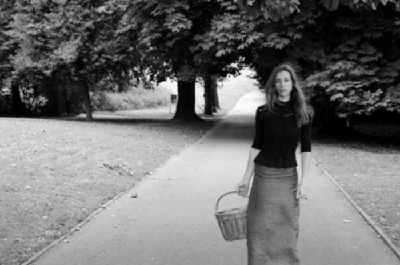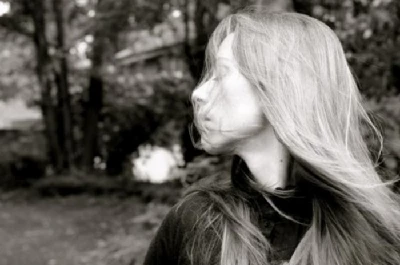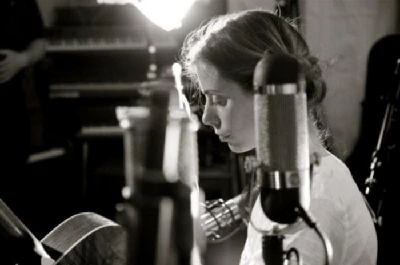published: 28 /
7 /
2009

Scottish singer-songwriter and instrumentalist Jo Hamilton has spent much of her life travelling the globe. She speaks to Lisa Torem about the influences and experiences that have lead to her releasing her debut album, 'Gown'
Article
Brazil nuts, dulcimers, wine glasses, violins and a gamelan? These seemingly random objects might seem out of place and mutually exclusive under ordinary circumstances, but collectively they embellish the tranquil soundscapes that comprise Jo Hamilton’s debut album ,‘Gown’
This singer-songwriter-instrumentalist heralded from Scotland, but globe-trotted as a child, absorbing and devouring images of lush mountainous landscapes, acoustic “roots” instruments and wide-rimmed smiles from lands as far-reaching as Sri Lanka, Turkey, Cambodia and Jamaica. Culling these kinesthetic memories with a fine-tooth comb - while keeping close to heart her austere beginnings - Hamilton braids them together to create this ethereal tour-de-force.
Engaging track titles such as ‘Deeper’, ‘Paradise’ and ‘Exist’ immediately inform the listener that ‘Gown’ is more a holistic, trail-blazing path to self-discovery than a day-tripping detour. Producer Jon Cotton and a host of cutting-edge guest artists climb aboard the caboose to add fine detail to what originally began as field recordings.
Jo Hamilton elaborated on the unique experiences leading up to the release of ‘Gown’, her inspirations, collaborations and musical beginnings for Pennyblackmusic.
PB: You’ve been compared to Annie Lennox, Kate Bush and Regina Spektor. Who, however, are your vocal influences?
JH: I appreciate so many singers nowadays, but I grew up largely unexposed to pop music. My early influences were the Gaelic music we learnt at school, Dolly Parton and other country and western artists, and Caribbean music at home. I'm not really driven by influences.I just try to get to the root of what moves me.
PB: Did you grow up in a musical family?
JH: All my siblings played an instrument or two, and we all sang a lot growing up, whether it be at home round the piano, or at the one-roomed school at the top of the hill in the middle of nowhere in the Highlands of Scotland, where we were tucked in a huge glen surrounded by a rugged barren landscape. My parents always encouraged us, and my Dad has always discouraged my Mum who has a wonderful and unique disability when it comes to getting a tune out of her head - we can never guess what it is.
PB: There is mention of the “overwhelming nostalgia of the old Gaelic lullabies of your childhood” in your promotional materials. It is also clear, however, that you’ve been nomadic – having lived in Turkey, Kuwait, Saudi Arabia and Sri Lanka. Given your travels, and your obvious adoration for the music of your heritage, how do you reconcile these diverse musical influences? Which define you?
JH: The places I've been to and the things I've seen are all put into a large cement mixer (the ones you pass on the motorway, always turning) and I love to see to what will surface first. I feel the memories I've made, or have been made for me all give a nod to each other, and none are foremost.
PB: The track, ‘All In Adoration’ embraces horns and a playful vocal performance, while ‘Paradise’ appears to be a mainstream ballad – having a more commercial appeal. Would you describe ‘Gown’ as genre-defying?
JH: I wanted to make a doorway to step through into what we can celebrate in the world. Our lives are varied emotional landscapes and that is reflected in the record. Someone said that the overall effect of ‘Gown’ for them is that it jogs their memory, it reminds them of who they are and what they have to look forward to, what matters. The message is essentially sentiment.
PB: Is there someone who inspired ‘Liathach’?
JH: We climbed Liathach (A Scottish mountain in the North West Highlands-Ed)together, thinking it was called ‘Death Mountain’. On discovering, however, it actually means ‘Big grey one’, I was able to make a bridge from mountain to song.
PB: Many of your lyrical images seem consistent with television/screenplay writing. They are descriptive, but concise and embody colour and physicality. Producer Jon Cotton has written for television. Did his experience with the visual media influence your decision to work with him?
JH: At a friend's house one evening, I heard the most clear and beautiful sounding music being played on the stereo. I remember being quite amazed at the depth of sound, and at the quality of the vocals. That was my introduction to Jon Cotton's work. He wasn't working on film music when we first started working together, but his ability to make the music 3D, like a Victorian peephole theatre that you can look and step into another world is spectacular, so when he offered to work on ‘Gown’, I felt it would be an exciting partnership.
PB: How did you approach learning the Appalachian dulcimer and the Indonesian gamelan? What brought you into contact with these instruments?
JH: The Appalachian dulcimer on the record was played by a friend of mine and was made for him by his Mum. I came across the gamelan hanging up in neat rows in a hut by a water filled volcano crater in Ratanakiri, Cambodia. I played and recorded it haphazardly while being accompanied by a young Cambodian saying "you play it wrong ways!". The atmosphere captured is probably more integral to the song than the playing expertise...
PB: ‘Gown’ began as a series of field recordings conducted in Cambodia. What led you there? Did you find what you were looking for?
JH: I think I found what I was looking for, but not for a few years after leaving Cambodia. I was in need of a change. My parents were working in Phnom Penh, so I went out to visit them and have time toute seule.
PB: Was it percussionist David Picking who developed the idea of using wine glasses and Brazil nuts for the recording sessions? What’s the back story behind the “Nordic rumblings?”
JH: David is a superb drummer and percussionist, and yes, he came up with the wine glasses and Brazil nuts on ‘There It Is’. I had started recording it at home, and at one stage I passed it to him to work on in his studio. He came back with the wine glasses and Brazil nuts in place and they stuck. The Nordic rumblings are by two Finnish friends when they came to visit. After a heavy stretching session one evening, I persuaded them to speak Finnish jibberish, and some of what they came up with is on ‘Paradise’.
PB: With such a wealth of textures, how did you go about showcasing your voice during production?
JH: Although ‘Gown’ travels over a lot of terrains, all of the songs were written around my voice, so although it required care as we built up the textures, they nestled in nicely. Jon's input helped a lot - he is a spectacular mixer, and we spent quite a while selecting microphones to suit different songs, using warm old ribbon mics in some places such as’ Liathach’, for example) and very breathy valve mics in others.
PB: Are you planning any tours or future recordings?
JH: We're planning a bigger tour later, but the thing I'm most excited about right now is the London launch of Gown on 22 September 2009 which is happening in Notting Hill at a wonderful, historic venue called the Tabernacle. And yes, I'm gathering material for future recordings now (just need to give Jon a bit of time to recover first!).
PB: Thank you.
Picture Gallery:-

